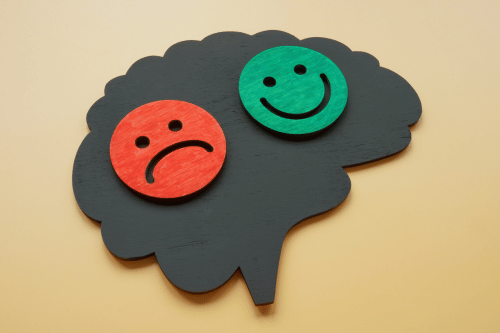Atypical Bipolar Disorder: Understanding, Symptoms, and Treatment
Understanding Atypical Bipolar Disorder
Atypical bipolar disorder is a unique variation of bipolar disorder, characterized by atypical symptoms that differ from the typical patterns seen in bipolar mood disorder. These symptoms can overlap with other mental disorders like depressive disorders and borderline personality disorder, making diagnosis more complex. Recognizing the clinical features and understanding the nuances of mood episodes is essential for accurate diagnosis and effective treatment.

Diagnostic Criteria
The DSM-5 defines the criteria for bipolar disorder types, including specific specifiers for atypical features. Features such as mood reactivity, Leaden paralysis, hypersomnia, and weight gain are hallmark signs of atypical presentation. Unlike typical manic symptoms, individuals with atypical bipolar often exhibit depressive symptoms and atypical depressions that respond strongly to positive events.
Mixed Features
Mixed features, where depressive and manic symptoms coexist, are common in bipolar spectrum disorder and add to the complexity of diagnosis. These symptoms are distinct from typical symptoms, requiring detailed evaluation by a mental health professional to ensure diagnostic accuracy.
Symptoms of Atypical Bipolar Disorder
Atypical bipolar disorder presents with a wide range of clinical symptoms, including:
- Increased mood reactivity: Emotional responses to external stimuli are exaggerated.
- Hypersomnia in mood disorders: Prolonged sleep patterns are common in depressed patients.
- Weight gain and appetite changes: An association with obesity is frequently observed.
- Interpersonal sensitivity: Heightened feelings of rejection or depressed mood can dominate.
Differences Between Typical and Atypical Symptoms
Typical bipolar symptoms, such as episodes of mania, differ significantly from those seen in atypical cases. While typical presentations often include hypomanic episodes, atypical features center around depressive episodes and subtle differences in the phenomenology of depression.
Subthreshold Bipolarity
Research on subthreshold bipolarity highlights the overlap between atypical features and conditions like cyclothymic disorder, emphasizing the importance of understanding the bipolar spectrum disorder in full.
Treatment Options for Atypical Bipolar Disorder
Effective treatment requires a combination of pharmacological and therapeutic approaches tailored to the clinical presentation.
Atypical Antipsychotics
Medications such as quetiapine and aripiprazole are widely used to manage bipolar depression and improve functional impairment. Monoamine oxidase inhibitors (MAOIs) have also shown efficacy, particularly in cases with atypical features specifier in the DSM.
Efficacy and Side Effects
While these medications are effective, side effects like weight gain and sedation are common. Regular monitoring by medical professionals helps balance efficacy with tolerability. The choice of therapy often depends on factors like age of onset, family history, and overall psychiatric history.
Behavioral Therapy
Behavioral therapy, including cognitive behavioral therapy (CBT), plays a crucial role in addressing depressive symptoms and improving coping strategies. This approach complements medication in managing the affective disorder and reducing the impact of occupational impairment.

Assessment Approaches
Accurate diagnosis involves evaluating both bipolar symptoms and overlapping conditions like schizoaffective disorder and depressive disorders.
Tools for Diagnosis
Cross-sectional studies and standardized tools like the Mood Disorder Questionnaire (MDQ) help clinicians identify atypical symptoms. These tools focus on recognizing patterns of depressive episodes, hypersomnia, and other features in depression.
Challenges in Diagnosis
Diagnosing atypical bipolar disorder is challenging due to the differences in presentation and frequent misdiagnosis as unipolar depression or anxious distress.
Misdiagnosis and Its Consequences
Misdiagnosis can lead to inappropriate antidepressant treatment, which may worsen symptoms or trigger manic episodes. Proper identification of atypical bipolarity is critical to avoid these pitfalls.
Complexity of Symptoms
The overlapping nature of clinical symptoms with other mental health conditions, such as dissociative symptoms and personality disorders, adds to the complexity. This highlights the importance of specialized evaluation by experienced healthcare professionals.
Recent Research and Meta-Analysis
Studies in journals like Acta Psychiatr Scand and Arch Gen Psychiatry provide valuable insights into treatment efficacy for atypical bipolar disorder. Network meta-analyses reveal the effectiveness of specific therapies in managing depressive periods and improving patient outcomes.
Study Methodologies
Research by experts like Hirschfeld RM and Greenberg PE emphasizes the importance of analyzing confounding variables to ensure diagnostic validity. Systematic reviews further explore the role of atypical antipsychotics in reducing functional impairment and improving overall quality of life.
Best Practices for Management
Managing atypical bipolar disorder requires a holistic approach that addresses both the biological and psychological aspects of the condition.
Individualized Treatment Planning
Tailoring treatment to the patient’s specific needs is critical. This includes selecting the right combination of medications and therapies to address clinical symptoms and improve long-term outcomes.
Holistic Approaches
Holistic care, including lifestyle changes like regular exercise and a balanced diet, supports medical treatment. Engaging in community discussion forums, mindfulness practices, and support groups can also improve mental health outcomes.
Conclusion
Atypical bipolar disorder is a distinct affective disorder that requires careful assessment and tailored treatment. Understanding its unique clinical features, diagnostic criteria, and treatment strategies is essential for effective management. Collaboration with mental health professionals and ongoing research will continue to improve outcomes for patients living with this complex condition.










